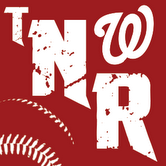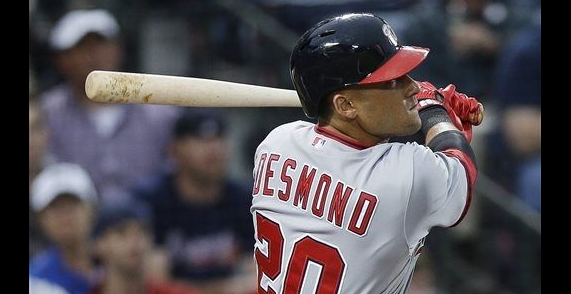Usually, over the course of a season, a game or two will be truly memorable. Something to make you go “yeah, that’s the season right there”. The Nats one-upped us, though, by putting in such a dreadful performance over a 10 game stretch, that when we look back at this season, these 10 games may be it.
Think back to just 11 games ago. The Nats were finally healthy, and they were scoring runs. We had watched and waiting for their offense to come back, and it finally did. I wrote about it several times, but by July 8th, they were the well-oiled machines we were hoping to see all year.
They had just trounced the Padres at home, scoring first 8, then 5, and then 11 runs in the finale. You’ll have to excuse me for being optimistic about the future at that point, the evening of Sunday July 7 and the whole blissful day of Monday, July 8. Sure, they weren’t in first place, but they were 4 games over .500. They were also only 4 games behind the Braves, with nary a team in between the two.
It was more than the record and their position in the East, though, it was the offense. It had finally come alive. They had, since a month before, managed 4.72 runs per game. An unsustainable number for sure, but a full month of the kind of run scoring that would be ranked second in all of the Nationals League. This timing also coincided exactly with the return of Rendon and Werth to the lineup, expanding it greatly. In between, the also got Harper and Ramos back, so of course it all made sense.
They still looked bad in a few games, but from June 9th to July 8th, they had gone through a significantly lower percentage of games only scoring 2 runs or less than they did before June 7th. It was, in short, looking much better for the Nats
[button url=’#’ size=’small’ style=’blue’] What a Difference 10 Games Makes [/button]
Then came the 10 days in July. They went away, to face two division foes, and like Crassus marching against the Parthians, they probably felt a bit confident about themselves. Over the course of the week, they lost 3 out of 4 to Philadelphia and then 2 out of 3 to Miami. Miami is not tied for the worst record in baseball with the Astros because the Nats didn’t sweep them. Otherwise, they would be.
They were beat up against those foes, but had a nice long All Star break to recover from their wounds. Instead, though, they ran into the red-hot Los Angeles Dodgers and were completely demolished at Nats Park, including a 9-2 defeat in which Jordan Zimmermann was shellacked.
In the course of those 10 games, the Nats have managed a measly 2.4 runs per game. They scored more than 3 runs exactly twice, in the two wins, and less than 2 in seven of the games. They have been miserable with Runners in Scoring Position, and have managed to lose a few games that they could have won.
There are plenty of excuses as to why the Nats didn’t do well. They were away, the Phillies are actually decent, the Dodgers are unstoppable right now. And those excuses are all logically sound, but they don’t change the fact that the Nats went 2-8.
And so, after 10 days, instead of averaging 4.72 runs per game since June 8, they’re averaging 4.18. That’s still enough to make for a good team, but the way those numbers came show something different. And in 8 of the last 10 game they just didn’t score that much.
[button url=’#’ size=’small’ style=’blue’] Predictive vs Indicative [/button]
When people say that stats like the Pitcher’s W or RBI are useless, I disagree with them. Pitcher’s W is borderline useless, other than indicating that the team won that day and who the starter might have been. But RBIs actually tell you about how the runs were scored. RBIs do nothing to predict what a hitter might be like – most “good RBI men” are good RBI men because they can hit and are in the middle of the lineup, so they get alot more opportunities.
Hitting with RISP is alot like that – it’s more indiciative of what happened than predictive of what will happen. That is to say, as you give a player, or a team, and infinite number of at bats, their average with RISP will be very close to their average without. It’s just the way it works, most people aren’t so much better when guys are on base. If they were, a good coach might question why they’re not trying hard when the bases are empty.
But results with RISP do tell us the story of what happened, and with the Nats, it’s awful. The fact is, over the last 10 games, the Nats have had ample opportunities to score and win. Instead, time and time again, they’ve failed to plate runners in scoring position with less than 2 outs. The 1-out bases loaded double strikeouts, they bunts that fail to advance baserunners (by guys who shouldn’t be bunting) and a thousand other methods of not scoring when opportunities present themselves have all been utilized.
They had great chances to win in games 1, 4, 6, 8 and 9 in this 10 game stretch. Close games, guys on base, all those things. If they had just 3 of those 6 games that they could have easily won, we’re talking about a ho-hum 5-5 week, a team sitting at 51-48, still only 4 games behind the Braves, in second place.
But they didn’t. They couldn’t come through at all when they needed to, and they’re now 2 games under .500, a half a game behind the Phillies.
The point of this is to say – the Nats actually can hit. The numbers on the baseball cards (5 starters with an OPS over .800, 7 with an OPS over .750) show that as a no-brainer. But whether it’s the need for a psychiatrist, or it’s just a 95th percentile statistical anomaly, they haven’t scored.
This team doesn’t seem to need wholesale changes. The starting 8 are hitting .271/.339/.443. Obviously that doesn’t include pitchers or any time a bench player comes in, but those numbers, with bench crappiness factored in, would be enough to give the Nats a top 5 offense. Between missed time and missed opportunities, though, it hasn’t happened.
In the end, this may have just been a really bad stretch in which even the good hitters who were starting didn’t manage to hit well with RISP. But it happened, and there’s no changing that.
But the hill they have to climb now is likely too great to surmount. I wouldn’t be shocked to see them turn in a great couple of weeks of baseball any day now. I wouldn’t be shocked, because they would be playing like their numbers and talent indicate they can do. But even if they do that, they still probably won’t be in much of a position to make the playoffs.
No, these 10 days don’t need to be the death knell of the season. But it was an abject disaster, and it will very difficult to recover. Unless they have a Miguel Tejada-led A’s type month ahead of them, it’s getting harder and harder to imagine they’ll get in the playoffs.

